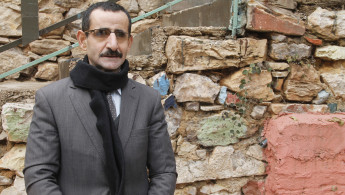Majed al-Majali: We can't put history in a box
The Jordanian poet Majed al-Majali may have been blind from birth, but not once has he lost sight of where his beliefs lie: with the Arab nation and its cause, and against the repressive authority of Arab regimes.
His cry for freedom has, however, come at a price. Majali has been arrested several times over the years, and on one occasion narrowly escaped death during a kidnapping.
In al-Araby al-Jadeed's brief interview with Majali, not only did he refuse to discuss any of the trials he has undergone in any detail, but he also refused the title of "political poet". Although politics features prominently in his poetry, he feels he is more a cultural figure than a political one.
This is because, according to Majali, culture endures and takes a strategic long-term view, while politics is fickle and inconstant. With politics, you are forced to adapt to and even accept imposed realities.
On intellectuals
As for an intellectual's position on politics, Majali said: "Whenever any intellectual decides to get involved in politics, his motivation must be cultural. An intellectual must alert Arab politicians to the need for constants and workable strategies, because their dependence on tactics leaves no room for any kind of strategising."
| Majali sees no place for intellectuals within government. |
Majali added he saw no place for intellectuals within government. This is because governments in the Arab world do not value and protect the role of culture and educated individuals within society. Instead, they see intellectuals as tools they can use to justify their repressive politics, which is harmful even in the sphere of politics.
With this in mind, Majali has written a number of sarcastic poems mocking the feebleness he feels has affected the Arab world. When Jordan announced its decision to attend the Israeli-Palestinian peace conference in Madrid in 1991, he wrote the poem, Farce, and sent a copy to the Jordanian Royal Court and the General Intelligence Department, writing on the back of the page, "this is by my hand, not that of your agents".
Majali lives alone in his flat in Jabal al-Luweibdeh in old Amman. His ability to adapt to and engage in the events of day-to-day life is remarkable, and his reflections upon his life and the things that hold him back are sharply sarcastic. Moreover, he does not perceive his blindness as a source of misery. "The state of happiness has nothing to do with whether or not you can see. It is a feeling that stems from within, and disregards external influences," he said.
On poetry and his rebellious political stance, Majali said: "I am a most ardent supporter of resistance, when it means turning our thoughts to freedom and all that it means in this life. But resistance just for the sake of it doesn't appeal to me in the slightest."
For this reason, Majali is no hurry, unlike other poets of the opposition, to sacrifice the quality of his literature in writing sharp political critiques. "Poetry, whatever it has achieved by its ruthless observations, should not be produced as a political text," he said.
On the Arab Spring
As our conversation with the poet drew to a close, we asked him what he thought about the Arab Spring, in light of the so-called grand conspiracy theory. He answered "This issue is flawed in two ways. We in the Arab nation live gloomily in the shadow of the regional states, and any attempt to overcome this situation is bound to come at a heavy price.
"Perhaps it was outside help, help that itself certainly does not come guilt-free - that pushed this abscess to bursting point, to prevent it from doing so naturally.
"Nonetheless, we must keep in mind that the abscess was there. The time has finally come for Arab regimes to grasp the fact that history cannot be put into a box. History will endure, and these regimes and their supporters have to realise that our fate does not lies in their hands."
Opinions expressed in this article remain those of the original author and do not necessarily reflect the opinions of al-Araby al-Jadeed, its editorial board or staff.
This is an edited translation from our Arabic website.



